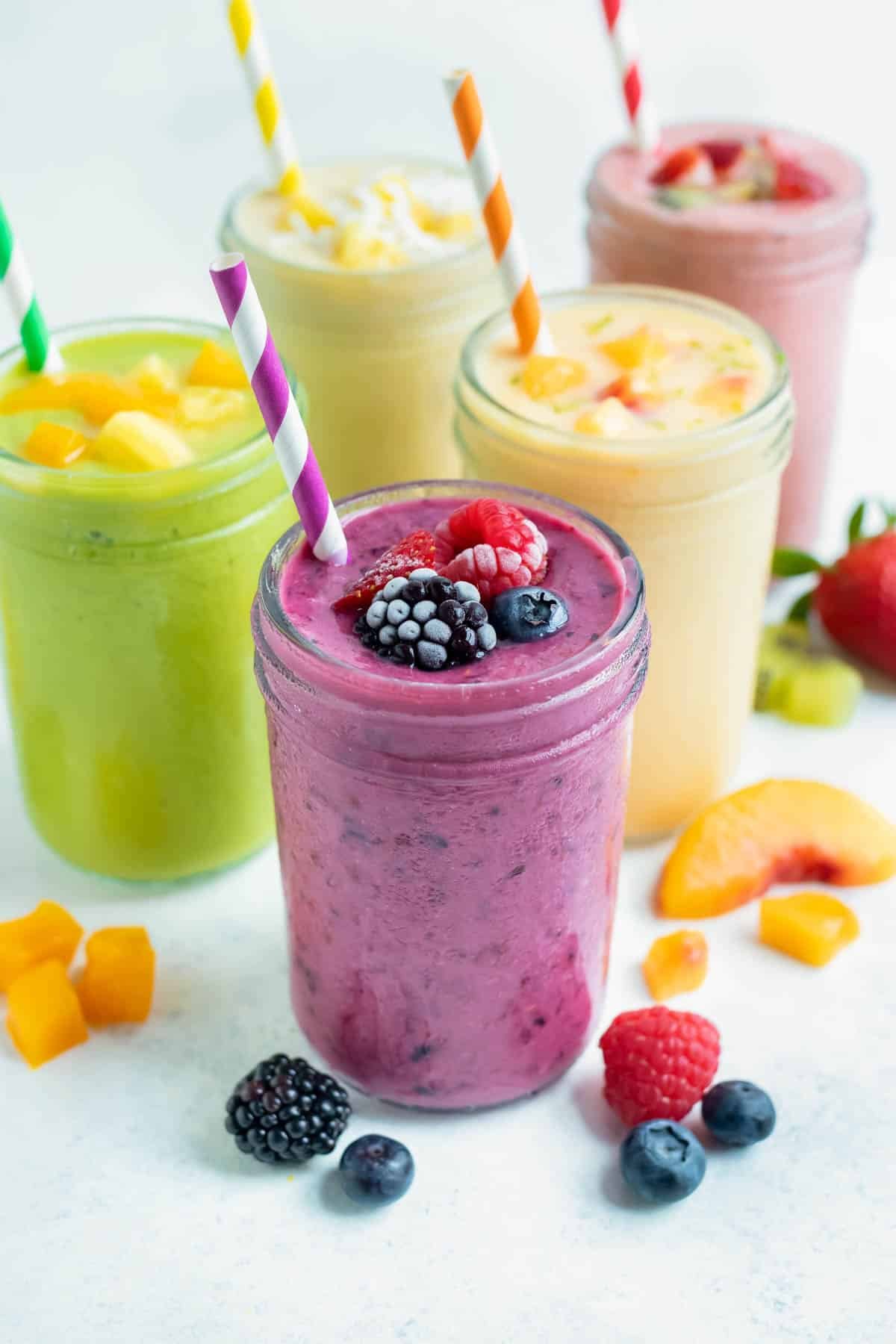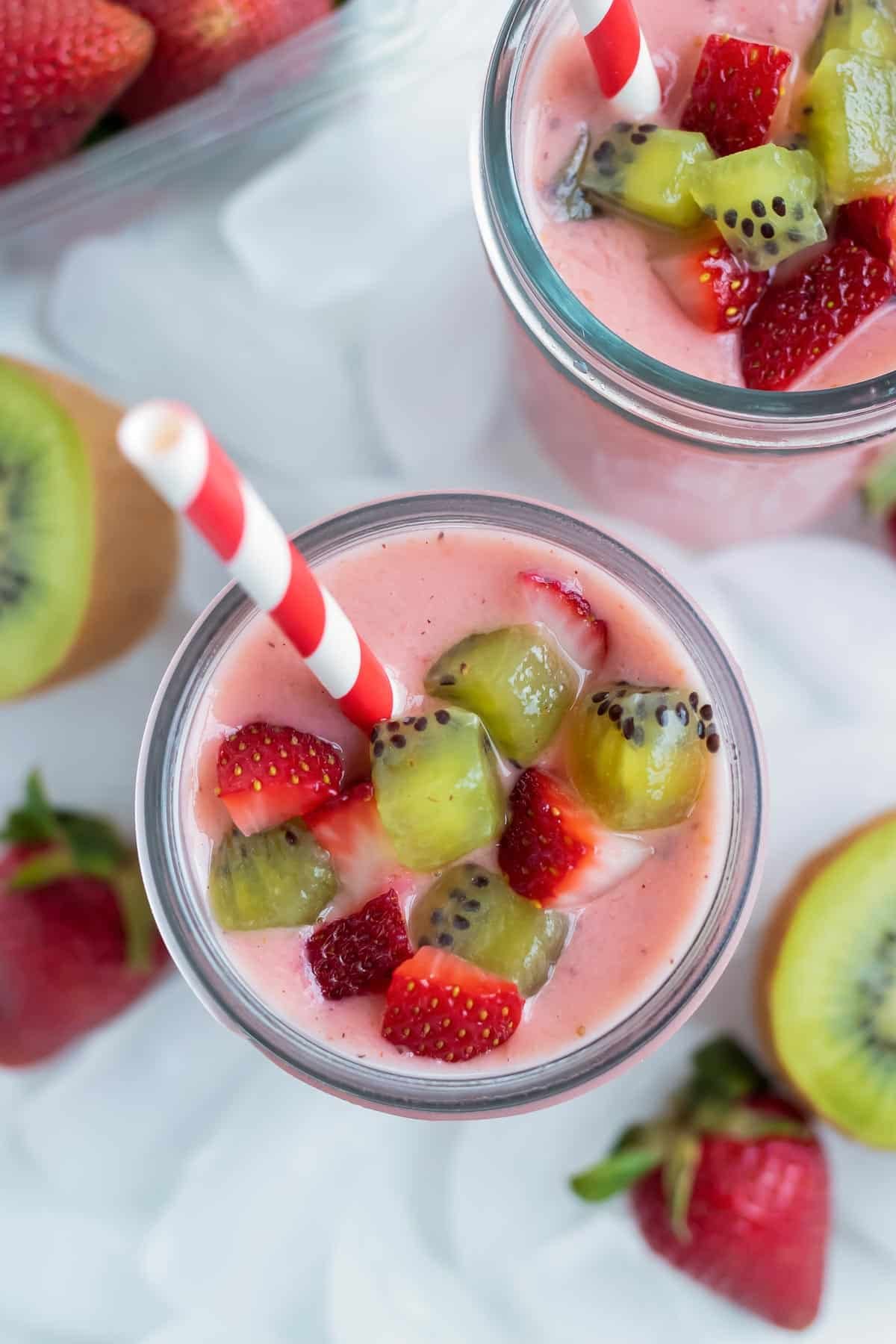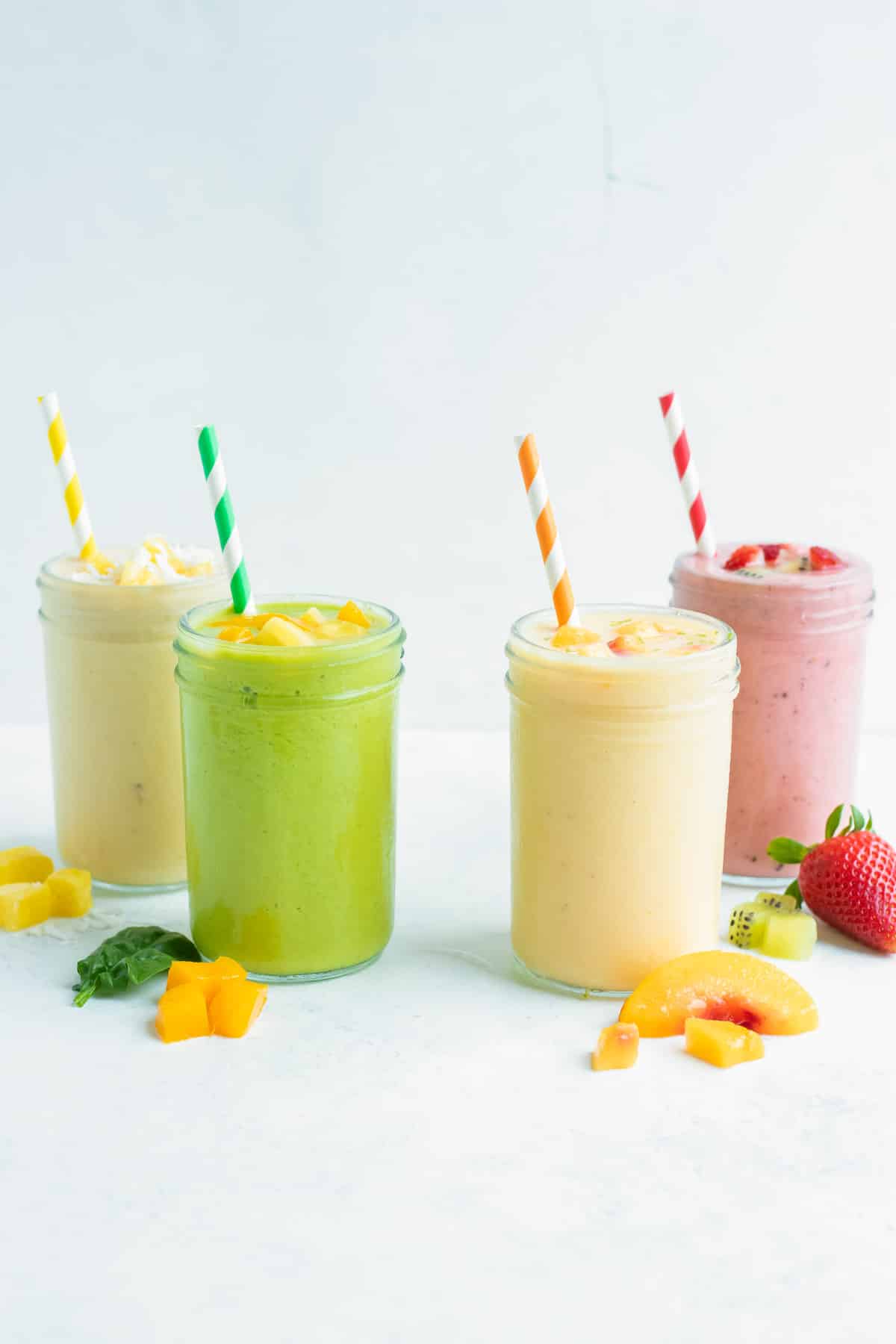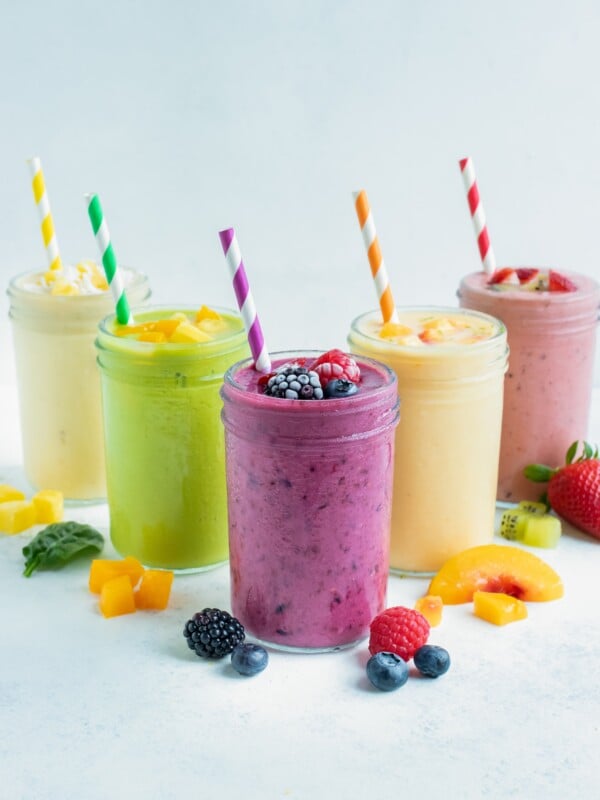What are smoothies?
Smoothies are thick, blended beverages loaded with ingredients like whole fruit, vegetables, nut butters, sweeteners, leafy greens, nuts, and milks. Smoothies start out with a base and a liquid, then you can add anything you prefer.
Smoothies usually contain frozen fruit or ice cubes to make it either an icy beverage or cold milkshake. Because there’s no one right way to make a smoothie, they’re super versatile, popular, and fun to incorporate into your daily diet! Let’s look at the common ingredients and different types of smoothies.
Learn How To Make A Fruit Smoothie in this post with simple, adaptable recipes!
Common Ingredients
- Fruits: Berries, bananas, peaches, mango, pineapple, citrus fruits
- Vegetables: Baby spinach, avocado, cucumber, carrots
- Seeds: Chia seeds, hemp seeds, flax seeds
- Nuts: Almond butter, peanut butter, other nut butters
- Herbs & Spices: Cinnamon, cocoa powder, turmeric, parsley
- Supplements: Protein powder, matcha, powdered vitamins and mineral supplements
- Liquid & Thickeners: Water, milks, cottage cheese, yogurt
- Sweeteners: Honey, maple syrup, ice cream, natural sugars
These ingredients are a great way to incorporate antioxidants, vitamins and minerals, and healthy fats into your diet.
Types of Smoothies
- Fruit Smoothies incorporate various fruits with juice, water, or milk.
- Green Smoothies have leafy green vegetables and fruit with water, juice, or milk.
- Protein Smoothies generally use fruit and/or vegetables, a liquid like fruit juice, and protein like yogurt, cottage cheese, or protein powder.
- Dessert Smoothies are made with ice creams, chocolate chunks, or flavored protein powders like cheesecake, pumpkin pie, or peanut butter cup.

Are smoothies good for you?
Yes, depending on what’s inside, smoothies are good for you. They’re a great way to incorporate healthy fats, whole foods, and essential nutrients in your everyday diet. Let’s take a look into the health benefits of smoothies.
14 Health Benefits of Drinking Smoothies
Depending on whether store-bought or homemade, there are a number of health benefits to incorporating smoothies in your daily diet:
Increased Fruit & Vegetable Intake
Eating additional fruits and veggies in smoothies can lower blood pressure and reduce the risk of many diseases and cancers. Packing your smoothies with 2-3 cups of these foods a day is an easy way to stay on top of your health.
Increased Fiber
Healthy smoothie recipes can provide a great source of fiber, which makes you feel full longer and aids in digestive health. To incorporate more fiber in your smoothies, add berries, apples, chia seeds, and bananas.
Post-Workout Recovery
Drinking protein-based smoothies right after a workout provides excellent hydration and protein for your muscles to recuperate. Having minimal carbohydrates in a post-workout smoothie will ensure the right muscle mass recovery.
Meal Replacement
If you’re a quick breakfast type of person, a smoothie packed with fruits, vegetables, and protein is a good way to sneak in a meal. Adding vitamin and mineral supplements will make this meal replacement even better.
Manage Food Cravings
Smoothies with a higher protein content keep you fuller longer and hydrated better. It’s one of the easiest ways to cut back on unnecessary snacking.
Weight Loss
Protein, via powders, cottage cheese, Greek yogurt, and other great add-ins, can help promote weight loss. Make sure that you check labels in store-bought protein smoothies, so you don’t consume unnecessary added sugar.
Hydration
The liquid component of your smoothie aids in hydration. The electrolytes found in many fresh fruit and vegetables keep your body in check. Add fluids with coconut milk, soy milk, or watermelon for optimal hydration.

Gut Health/Digestion
A healthy digestive system needs fiber in order to process foods correctly. Adding a variety of fruits and vegetables are a great way to promote a healthy gut. Plus, smoothies are considered a liquid food because your body will take less effort in digesting them.
Antioxidants
Adding fruits like strawberries, blueberries, raspberries, pomegranates, and blackberries will add many natural antioxidants to fight against bad free radicals in your body. Additionally, spinach, kiwis, and raw cocoa powder assist with a vitamin A boost.
Fights Depression
Eating a healthy smoothie can fight off depression. The vitamins, minerals, and macronutrients in a smoothie assist in keeping your body balanced not only physically, but mentally. It helps your brain and body communicate your needs.
High in Calcium
Calcium is needed for bones, teeth, and proper muscle functions. Solid and liquid parts of a smoothie like fortified almond milk or coconut milk will assist in calcium supply.
Manages Blood Sugar
To lower blood sugar, smoothie ingredients with a low glycemic index will release sugar into your bloodstream slowly. This prevents a blood sugar spike that can be detrimental to your health.
Reduces Risk of Heart Disease
Increasing fruits, vegetables, nuts, and whole grains will keep your heart healthy. Smoothies are a convenient way to do that on a daily basis.
Hormone Balance
A great natural way to balance hormones are in the natural foods that you can blend up in a smoothie. Making smoothies from scratch reduces any type of added sugar in your diet. Healthy fats like avocado and nuts are also helpful ingredients for balancing hormonal functioning.

Health Tips for Making Smoothies
Smoothies are so easy to adapt to your preferred daily diet. Here are some tips when you are making your own smoothie:
- To reduce fat macronutrients, choose low-fat or plant-based milks instead of full-fat milk.
- To balance out sugar, add those leafy green vegetables for more fiber, calcium, and iron.
- Flavored yogurts have more sugar compared to plan yogurts, so do away with other sweeteners like honey or sugar when using them.
- Add protein especially to breakfast, post-workout, and meal replacement smoothies.
- If you’re wanting a quick and refreshing snack smoothie, make sure it’s low in calories, since meals are higher in calories.
Disadvantages to Smoothies
If you aren’t intentional about your ingredients, smoothies can end up empty of real nutrition. To avoid this, follow these important steps:
- Measure out ingredients, so you get the correct serving amount in your smoothie.
- If you’re replacing a meal with a smoothie, add protein or you’ll be binge-snacking until dinner.
- Be aware of the amount of sugars in the fruit and sweetener components.







